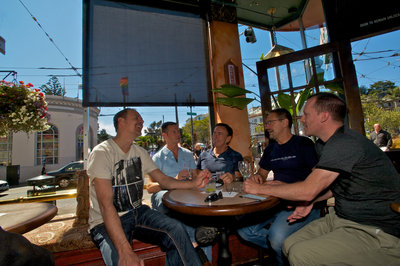The process is under way to grant landmark status to the Twin Peaks Tavern, a decades-old Castro neighborhood bar made famous by its large, revealing windows.
The seven-member San Francisco Historic Preservation Commission voted unanimously Oct. 17 to confirm their nomination of the bar, at 401 Castro St., as a historic landmark. The tavern first opened in 1935.
According to the Planning Department’s draft designation report on the tavern, which became known as a gay destination after two lesbians bought it in 1972, the business is “the first known gay bar to feature full-length open-plate glass windows,” and it’s “a living symbol of the liberties and rights” that LGBTs have gained since the 1950s.
The bar also retains other character-defining features, including signage, the report says.
City planner Moses Corrette, who identifies as queer, said in an interview that when Twin Peaks opened, “people could still get fired from their job for being a homosexual,” even in San Francisco. At the same time, “police were raiding bars,” he said.
“That the Twin Peaks had full, open windows really made a lot of progress for the gay community to literally be out, to be seen,” Corrette said.
In an email, Jeffrey Green and George Roehm, who have owned the bar for the last nine years, said, “By being in this bar where they could be seen by all walking or driving by, [patrons] were making a statement very early on.”
The Historic Preservation Commission’s recommendation will be sent to the Board of Supervisors. If the board approves the designation, which appears to be unopposed, the proposal will go to Mayor Ed Lee for his signature. If the mayor approves the status, it will go into effect 30 days after he signs it.
The process could be completed by the end of the year, although the November elections may delay things.
Among the benefits of landmark status, California’s historical building code provides alternative building regulations for permitting repairs, alterations and additions necessary for the preservation, rehabilitation, relocation, related construction or continued use of a qualified historical building.
“We feel the importance of this action is to preserve this not only for ourselves but for future generations, and not only in San Francisco but as a model for other communities and cities nationwide,” Green and Roehm, who are gay, said.
They said their spouses are “silent partners” in the bar.

